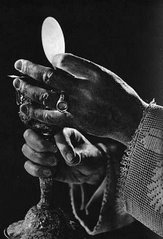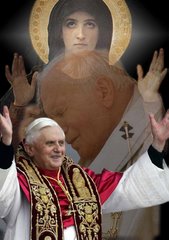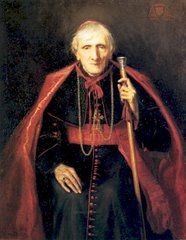Good Friday is the day in which the greatest disorder happened: man killed his creator. The greatest evil happened yet it was met with prayer and the even greater love. Joey Reed submitted this reflection on order and prayer a while ago, and I thought it was good enough to save for Holy Week. So enjoy:
In teaching my students about what it means to be an image of God, a much clearer view of human nature has emerged within my own spiritual vision.
What is natural to man? Is indulgence in worldly affairs natural? Is revelry in sexual adventure that which completes man? To know what is natural to man, one must first know man’s nature.
To say that something is natural, one is claiming that that which is deemed natural is in accordance with the nature of the thing being observed. For example, is it natural for a fish to swim? Of course it is. By observing the nature of the fish, the conclusion is easily reached that swimming is natural to the fish, for that is part of its nature. A fish that doesn’t swim quickly dies. A bird that doesn’t fly falls to its death. A man that doesn’t pray is crushed under the weight of the world, for he is not made for the world in both his and its present state.
This begs the question: What is man’s nature? The answer is both simple and profound -- man is an image of God. The image must tell us something of that which it reflects, and if the image is a reflection of eternity, then to reflect eternity for all eternity is what is natural to it. This is confirmed by St. Gregory of Nyssa in his Catechetical Orations in which he writes:
“If humanity is called to life in order to share in the divine nature, it must have been suitably constituted for the purpose…That is why humanity was given life, intelligence, wisdom, and all the qualities worthy of the godhead, so that each one of them should cause it to desire the godhead, so that each one of them should cause it to desire what is akin to it. And since eternity is inherent in the godhead, it was absolutely imperative that our nature should not lack it but should have in itself the principle of immortality. By virtue of this inborn faculty it could always be drawn towards what is superior to it and retain the desire for eternity.”
God is all good, and order is good. Therefore, God is Order itself. We see a reflection of the face of God in His creation. The Orthodox theologian Olivier Clement in his book “The Roots of Christian Mysticism” writes: “Each being manifests the creative word which gives it its identity and attracts it. Each being manifests a dynamic idea, something willed by God. Ultimately each thing is a created name of him who cannot be named.” There is order in creation, for its Creator is order itself. Order begets order. Man is an image of God, therefore he is made in the image of Order. Order is part of man’s nature as an image of God, therefore disorder is unnatural to man.
In God, all of His attributes are one. Because he is eternal and infinite, He cannot be made of parts, nor does He possess parts. He is one is His essence. This has infinite implications, a few being that His order is His love, His love is His justice, His justice is His love, His love is His order, etc. God is all these good things, and man being an image of God finds in them his natural habitat. It is natural for man to have order both in the world and in his mind, will, and body. It is natural for man to love, to seek justice, etc. It is unnatural for man to do anything else. Yet more often than not, we do that which is unnatural to us and claim that it is simply human nature. This couldn’t be farther from the truth! To do anything but love, seek justice, obey God, etc. is to introduce disorder into our minds, wills, and bodies. Disorder in the human soul is manifested in many and various ways, all of which are hideous to the ordered soul.
Who is the man that embraces disorder? He is the one that is confused, addicted, angry, materialistic, yet all the while convincing himself that he has found happiness and contentment. Of course, the conclusions of a disordered mind will almost always be disordered.
How must a disordered system be overcome? By introducing order into the system. When it comes to the human soul made in the image and likeness of Order, Order must be brought into the disordered soul. By an opening up of the soul to the influence of Order through the indwelling of Order can the human soul begin to banish from it the darkness of disorder. This opening up of the soul is called prayer, which is as natural to man as barking is to a dog, as flying is to a bird, as swimming is to a fish. Yet we are like dogs that do not know how to bark and fish that cannot swim. We are dominated by the world which was created to be dominated by us. How absolutely unnatural!
Prayer is our best bet for happiness as happiness can only be found in order. In fact, order is happiness. The purpose of prayer is to turn outside of ourselves, to empty the image in order to be filled with the reality. It is our nature to empty ourselves to both God and neighbor, that in emptying ourselves we may be filled. Fulfillment in emptiness! Yet another of those wonderful Christian paradoxes.
How can we know that our calling is to turn and open to others? If we were created to turn in on ourselves, then our eyes would be facing the opposite direction. We would be created to look inward. But according to nature that is not so. We look outward. It is in looking outward that we can empty ourselves just as the greatest Man, the God-man, did: “Who though He was in the form of God, did not regard equality with God something to be grasped; Rather, He emptied Himself, taking the form of a slave…”
Through prayer, we look outward to the Source of all order and happiness. Through prayer, we empty ourselves of our worldly accretions, placing ourselves under the direct influence of a Perfect Order. As Order begins to reign in our souls, so, too, does love, truth, joy, peace, and all other attributes of God.
We pray in order that the unnatural be overcome by the natural, that darkness might become light, and that disorder be crushed under the liberating weight of Order.
Friday, April 06, 2007
Thursday, April 05, 2007
Prayer Request
I saw this on Ad Majorem Dei Gloriam and figured I should pass it on: Priest on Trial.
Keep him in your prayers you all go through the Easter celebrations.
Keep him in your prayers you all go through the Easter celebrations.
Wednesday, April 04, 2007
Screwtape #13: The Role of Pleasure
Thirteen is an unlucky number and this holds true for Wormwood. The patient who had been falling away from the faith has now recommitted and Screwtape is threatening Wormwood with great torments because of it.
How did this happen? Wormwood got lazy and let the patient read a book and take a walk. Nothing dramatic it would seem but as Screwtape says this is a very real deterent from hell.
In other words, those under the devil are under a disguise and falsehood. Similar to the Matrix or the cave, they will persist in their ways until shown another way. Real pleasure is that the other way, the red pill or the sun. These real pleasures strike down the façade and invite the patient to connect with reality. Reality, of course, is God. This might be a helpful tool in evangelizing. We might be well advised to help people who have fallen away from the Church connect with the real first. Show them a good movie, a pretty painting, or take a walk with them. As all pleasures are from God and God is in all things any genuine pleasure will do (note that genuine does mean in the bounds of morality). Of course, this means that C.S. Lewis is ascribing to the Ignatian ideal of God in all things. That is, Lewis is a closet Jesuit
Screwtape goes on to explain that pleasure succeeded in this way b/c created us to be in accordance with our natures (it seems Lewis is a closet Thomist as well). This creates a paradox between detaching from ourselves for His sake. He says,
What Screwtape is trying to convince Wormwood to do is to cause in the patient an error similar to that committed by Gerard Manley Hopkins. Hopkins, on becoming a Jesuit priest, tried to give up his poetry and writing for the sake of his order because he considered it beneath the dignity of the order. However, he soon returned to writing and because of that decision we have many inspiring poems that have helped people in the faith. If we do something well and enjoy it then we ought to pursue it. Whether it’s being among people, football, sports, music, dancing, or writing as it is in Hopkins’s case, we are given these gifts and desires in order to experience real pleasure in accordance with our nature and in order to taste of the cup from which we shall have our full of in eternal life.
How did this happen? Wormwood got lazy and let the patient read a book and take a walk. Nothing dramatic it would seem but as Screwtape says this is a very real deterent from hell.
“In other words you allowed him two real positive Pleasures. Were you so ignorant as not to see the danger of this? The characteristic of Pains and Pleasures is that they are unmistakably real, and therefore, as far as they go, give the man who feels them a touchstone of reality. Thus if you had been trying to damn your man by the Romantic method…you would try to protect him at all costs from any real pain; because, of course, five minutes’ genuine toothache would reveal the romantic sorrows for the nonsense they were and unmask your whole stratagem. But you were trying to damn your patient by the World, that is by palming off vanity, bustle, irony, and expensive tedium as pleasures. How can you have failed to see that a real pleasure was the last thing you ought to have let him meet?
In other words, those under the devil are under a disguise and falsehood. Similar to the Matrix or the cave, they will persist in their ways until shown another way. Real pleasure is that the other way, the red pill or the sun. These real pleasures strike down the façade and invite the patient to connect with reality. Reality, of course, is God. This might be a helpful tool in evangelizing. We might be well advised to help people who have fallen away from the Church connect with the real first. Show them a good movie, a pretty painting, or take a walk with them. As all pleasures are from God and God is in all things any genuine pleasure will do (note that genuine does mean in the bounds of morality). Of course, this means that C.S. Lewis is ascribing to the Ignatian ideal of God in all things. That is, Lewis is a closet Jesuit
Screwtape goes on to explain that pleasure succeeded in this way b/c created us to be in accordance with our natures (it seems Lewis is a closet Thomist as well). This creates a paradox between detaching from ourselves for His sake. He says,
“Hence, while He is delighted to see them sacrificing even their innocent Wills to His, He hates to them drifting away from their own nature for any other reason. And we should always encourage them to do so. The deepest likings and impulses of any man are the raw material, the starting point, with which the Enemy has furnished a point gained; even in things indifferent it is always desirable to substitute the standards of the world, or convention, or fashion, for a human’s own real likings and dislikings. I myself would carry this very far. I would make it a rule to eradicate from my patient any strong personal taste which is not actually a sin.”
What Screwtape is trying to convince Wormwood to do is to cause in the patient an error similar to that committed by Gerard Manley Hopkins. Hopkins, on becoming a Jesuit priest, tried to give up his poetry and writing for the sake of his order because he considered it beneath the dignity of the order. However, he soon returned to writing and because of that decision we have many inspiring poems that have helped people in the faith. If we do something well and enjoy it then we ought to pursue it. Whether it’s being among people, football, sports, music, dancing, or writing as it is in Hopkins’s case, we are given these gifts and desires in order to experience real pleasure in accordance with our nature and in order to taste of the cup from which we shall have our full of in eternal life.
Subscribe to:
Posts (Atom)





